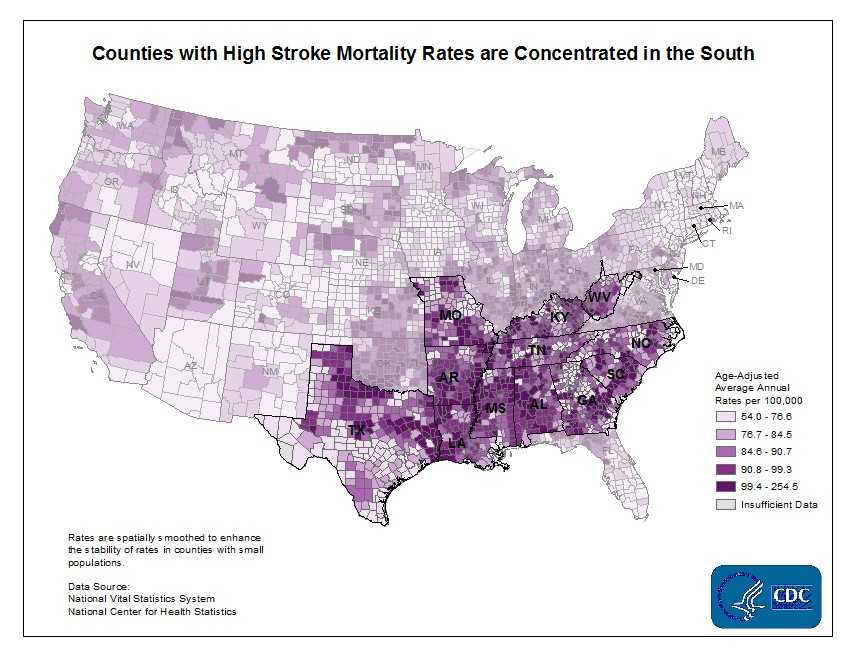Stroke Facts

The country’s highest death rates from stroke are in the southeastern United States.2
Find facts and statistics about stroke in the United States.
Stroke Statistics
- Stroke kills about 140,000 Americans each year—that’s 1 out of every 20 deaths.1
- Someone in the United States has a stroke every 40 seconds. Every 4 minutes, someone dies of stroke.2
- Every year, more than 795,000 people in the United States have a stroke. About 610,000 of these are first or new strokes.2
- About 185,00 strokes—nearly 1 of 4—are in people who have had a previous stroke.2
- About 87% of all strokes are ischemic strokes, in which blood flow to the brain is blocked.2
- Stroke costs the United States an estimated $34 billion each year.2 This total includes the cost of health care services, medicines to treat stroke, and missed days of work.
- Stroke is a leading cause of serious long-term disability.2 Stroke reduces mobility in more than half of stroke survivors age 65 and over.2
Stroke Statistics by Race and Ethnicity
- Stroke is the fifth leading cause of death for Americans, but the risk of having a stroke varies with race and ethnicity.
- Risk of having a first stroke is nearly twice as high for blacks as for whites,2 and blacks have the highest rate of death due to stroke.1
- Though stroke death rates have declined for decades among all race/ethnicities, Hispanics have seen an increase in death rates since 2013.1
Stroke Risk Varies by Age
- Stroke risk increases with age, but strokes can—and do—occur at any age.
- In 2009, 34%of people hospitalized for stroke were less than 65 years old.3
Early Action Is Important for Stroke
Know the warning signs and symptoms of stroke so that you can act fast if you or someone you know might be having a stroke. The chances of survival are greater when emergency treatment begins quickly.
- In one survey, most respondents—93%—recognized sudden numbness on one side as a symptom of stroke. Only 38% were aware of all major symptoms and knew to call 9-1-1 when someone was having a stroke.4
- Patients who arrive at the emergency room within 3 hours of their first symptoms often have less disability 3 months after a stroke than those who received delayed care.4
Americans at Risk for Stroke
High blood pressure, high cholesterol, smoking, obesity, and diabetes are leading causes of stroke. 1 in 3 US adults has at least one of these conditions or habits.2
You can take steps to prevent stroke.
More Information
From CDC:
- Stroke
- Vital Signs: Preventing Stroke Deaths
- Signs and Symptoms of Stroke
- High Blood Pressure
- High Cholesterol
- Smoking
- Diabetes
- Obesity
From other organizations:
- What You Need to Know About Stroke—National Institute of Neurological Disorders and Stroke
- Know Stroke: Know the Signs, Act in Time–NINDS
- Mind Your Risks–National Institutes of Health
- Stroke–Medline Plus
- Brain Attack Coalition
- Cryptogenic Stroke Public Health Conference Report 2015
- Internet Stroke Center
- Stroke Resource Center–American Heart Association/American Stroke Association
- World Stroke Organization
References
- Vital Signs: Recent trends in stroke death rates – United States, 2000-2015. MMWR 2017;66.
- Benjamin EJ, Blaha MJ, Chiuve SE, et al. on behalf of the American Heart Association Statistics Committee and Stroke Statistics Subcommittee. Heart disease and stroke statistics—2017 update: a report from the American Heart Association. Circulation. 2017;135:e229-e445.
- Hall MJ, Levant S, DeFrances CJ. Hospitalization for stroke in U.S. hospitals, 1989–2009. NCHS data brief, No. 95. Hyattsville, MD: National Center for Health Statistics; 2012.
- Fang J, Keenan NL, Ayala C, Dai S, Merritt R, Denny CH. Awareness of stroke warning symptoms—13 states and the District of Columbia, 2005. MMWR 2008;57:481–5.
- Page last reviewed: September 6, 2017
- Page last updated: September 6, 2017
- Content source:



 ShareCompartir
ShareCompartir
